The Best and Amazing Healthy Foods for Health in South Africa

This article explores the best and amazing healthy foods for health in South Africa.
South Africa has a blessing of cultural diversity in its food.
Hence, it offers a variety of healthy cuisines from diverse cultural traditions.
From morogo and pumpkin leaves to the heartland of the Cape with umngqusho (samp and beans).
Indeed, South Africa is the country of healthy living.
Let’s begin exploring the best healthy foods in South Africa for optimal health.
What are Healthy Foods?
There is a need to have a common ground.
Don’t you think?
What is healthy food to Thandi will be different to Alicia.
Why is that so?
Let’s take a banana as an example. Banana has many benefits for your health.
Thandi has irritable bowel syndrome (IBS), and banana is a healthy treat for her.
But Alicia has kidney disease. Because of its high potassium content, bananas are deadly for her.
Now…
What, then, is healthy food?
But wait.
The healthy food debate doesn’t end with a banana.
Here’s another kicker…
Indeed, you know vitamin A tablets have fantastic antioxidant properties.
However, the same vitamin A you consume can overload the liver and cause toxicity.
Here’s the truth…
Healthy foods are foods that are nutrient-dense and are low in calories.
Healthy eating means putting your health and wellness first. You must consume nutritious foods for your body.
But
Remember, healthy foods are best for your body, cognitive health, and mood.
What healthy foods are available in South Africa?
The Superpowers of Fruits and Vegetables for Optimal Health
Farmers are in abundance in South Africa.
There is always a variety of fruits and vegetables throughout the year.
Here’s the deal.
The very fruits and vegetables that are healthy for you are available.
Let’s explore some vegetables to boost your health.
Vegetables for Your Health
Pumpkin Leaves
Pumpkin leaves are versatile.
You can cook them in a variety of ways.
Pumpkin leaves have various health benefits.
But do they surpass the power of cruciferous vegetables?
Cruciferous Vegetables
Cruciferous vegetables belong to the Cruciferae family. This family mainly contains the Brassica genus.
Here are a few healthy cruciferous vegetables…
Kale
This wonderful vegetable is the king of super healthy leafy greens.
It contains vitamins C, B6, K, potassium, calcium, magnesium, copper, and manganese.
Studies have shown that the antioxidants in kale are beneficial for your health and well-being. And how glucosinolates may help protect against cancer.
Kale may help slow cognitive decline and age-related macular degeneration.
Kale has various bioactive compounds, including isothiocyanates and Indole-3-Carbinol, which help fight cancer.
These compounds also boost DNA repair in cells.
Vitamin K and flavonoids in kale are fat-soluble. Fat increases its absorption in the body.
Bok Choy
Bok choy contains vitamins B6, C, K, folate, and calcium.
It also contains carotenoids, like beta-carotene. Beta-carotene may help prevent heart disease, stroke, and some cancers.
Bok Choy has phytochemical compounds.
For example, it contains indole-3-cardinal (an indole) and sulforaphane, an isothiocyanate. Sulforaphane lowers cancer risk.
Can you see you can beat cancer by eating nutrient-dense and healthy foods?
Broccoli
Broccoli is the most nutrient-dense food in the world.
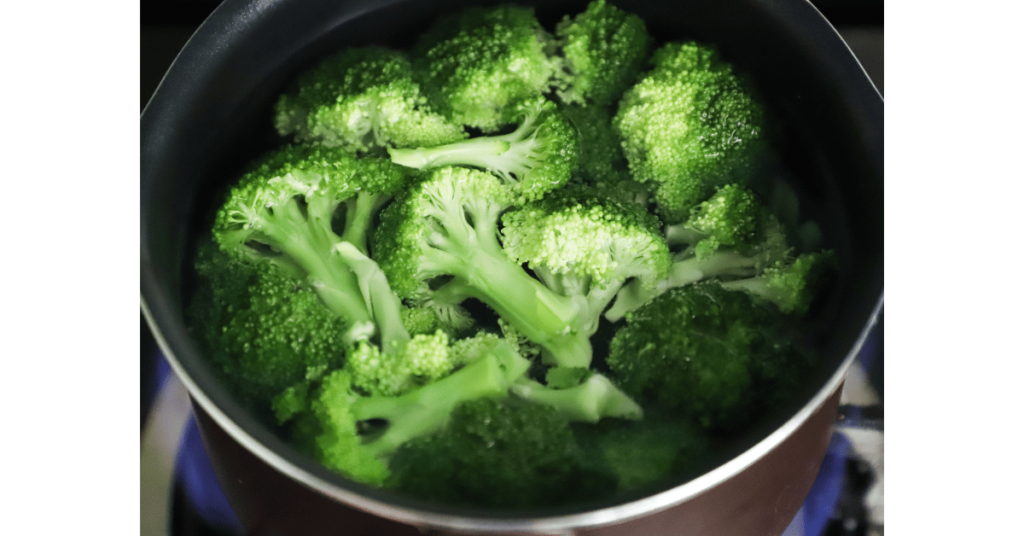
It contains vitamins C, K, and B.
Broccoli also has folate, potassium, iron, manganese, magnesium, phosphorus, and selenium.
It also includes a variety of phytonutrients. These include carotenoids, flavonoids, glucosinolates, phenolic acids, and lignans.
Broccoli is another source of sulforaphane. It may be the most potent anticancer compound.
Sulforaphane helps in inhibiting lung and colorectal cancer.
In addition to sulforaphane, broccoli contains another chemical, 3,3’–diindolylmethane (DIM). The digestive system quickly absorbs DIM. DIM prevents cervical cancer.
Eating broccoli may help prevent non-alcoholic liver disease and liver cancer.
Anticancer phytonutrients called isothiocyanates in broccoli fight cancer by neutralizing carcinogens.
Broccoli also contains lutein and zeaxanthin. These antioxidants may help prevent eye disease.
This vegetable is the absolute master of nutrient-dense foods.
You can buy these healthy foods at local supermarkets.
Supermarkets like Woolworths, Checkers, Pick n Pay, and Spar.
Brussels Sprouts
Brussels Sprouts are a cruciferous vegetable. They’re rich in vitamin K, C, potassium, iron, and folate. They also contain pyridoxine, tryptophan, and thiamine. Plus, they have flavonoids, glucosinolates, carotenoids, and lignans.
Brussels Sprouts contain a compound called sinigrin. This chemical compound suppresses the development of precancerous cells.
This vegetable is high in isothiocyanates and sulforaphane, compounds that fight cancer. Potassium in Brussels sprouts helps lower blood pressure.
Folate may help prevent congenital disabilities.
The fibre in Brussels sprouts may help maintain weight loss.
Brussels Sprouts help combat cellular oxidation. This oxidation is associated with ageing and chronic diseases.
Cabbage
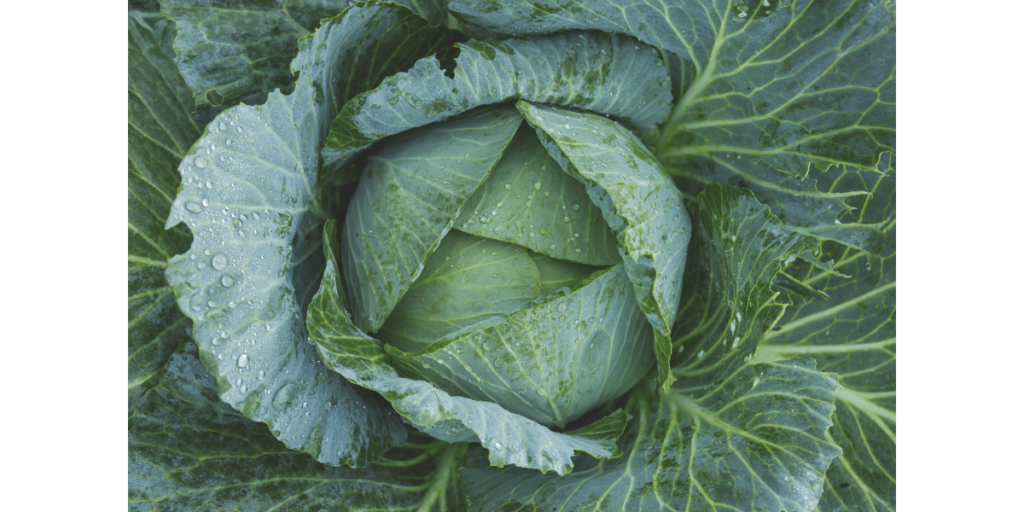
It contains vitamin C, calcium, magnesium, potassium, dietary fibre, folate, and phytonutrients.
Cabbage contains a small amount of the eye-healthy carotenoids lutein and zeaxanthin.
Phytochemicals and indoles in cabbage may reduce the risk of breast cancer.
Like other cruciferous vegetables, cabbage contains sulforaphane that protects against breast cancer.
Anthocyanins in red cabbage may help boost insulin production. They may also lower blood sugar levels.
Bioflavonoids and other plant chemicals inhibit tumour growth. Bioflavonoids also protect cells against damage from free radicals.
Anyone can afford a cabbage.
I even have plenty of it in my garden.
Spinach
Spinach has a minute amount of fat and cholesterol.
It is high in niacin, zinc, vitamins A, C, E, and K. Spinach also contains thiamine, B6, and folate. It has calcium, iron, magnesium, phosphorus, potassium, copper, and manganese.
Spinach is full of flavonoids and antioxidants. They maintain vital brain function, memory, and mental clarity.
Spinach also contains carotenoids like beta-carotene, lutein, and zeaxanthin. It also includes a unique class called epoxyxanthophylls. Epoxyxanthophylls boost many systems in the body.
Phylloquinone is the most common form of vitamin K found in dark green vegetables like spinach. It is vital for proper blood clotting and may also affect bone health.
You can make a variety of dishes with spinach. You can steam or stir-fry or add a salad or a smoothie.
Swiss Chard
Swiss Chard contains several flavonoid antioxidants, including quercetin, kaempferol, rutin, and vitexin.
Kaempferol is a potent anti-inflammatory compound that may also have anticancer properties.
Research shows Vitexin may help prevent heart disease. It may lower blood pressure and inflammation and block the formation of blood clots.
You can source all these vegetables from your home garden and farm markets.
Vegetables of Choice
Squash
There are summer squash and winter squash.
They contain molybdenum, pyridoxine, potassium, folate, dietary fibre, phytonutrients, carotenoids, and lignans.
Summer squash, such as zucchini, is high in vitamins C and A.
Winter squash, like butternut, is an excellent source of health-supportive carotenoids.
These include beta-carotene, lutein, and zeaxanthin. Butternut is a vitamin A giant and can help with weight loss.
Squash’s soluble fibre helps to lower cholesterol. Seeds contain magnesium and omega-3 fatty acids. Its fibre content helps manage weight and helps reduce low-density lipoprotein (LDL).
Flowers, fruits, and seeds are edible.
You squash everything!
Beet
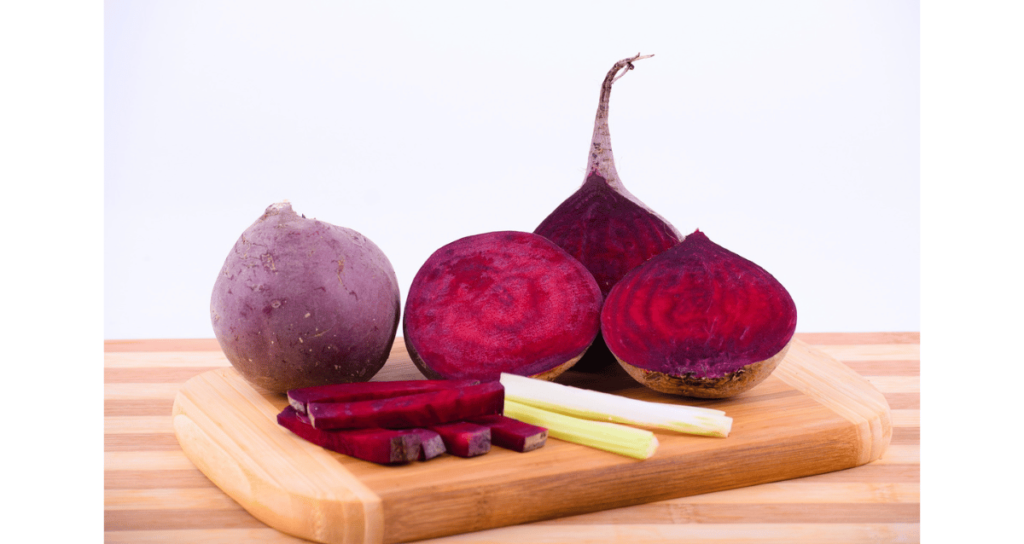
This root vegetable is a good source of dietary fibre. It also provides folic acid, potassium, magnesium, iron, copper, and vitamin C.
Beets have the high sugar contents of any vegetable yet are low in calories.
They are anti-inflammatory and antioxidant vegetables.
All Beets get their red colour from a compound in them called betacyanin. Betacyanin may help defend cells against harmful carcinogens.
Beets are also an essential source of betanin.
Betanin and folate work together to reduce potential toxic levels of homocysteine. High levels of homocysteine can harm blood vessels and cause inflammation.
Beets have a property that can inhibit damage to your arteries. This property can increase your risk of heart disease.
Mushrooms
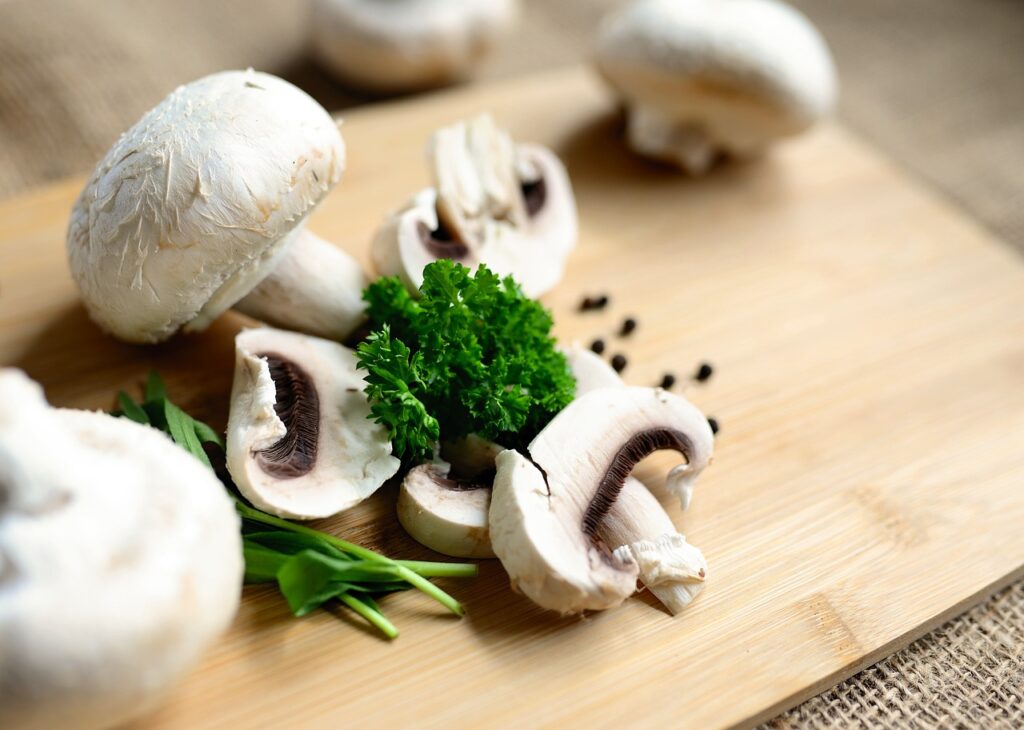
Mushrooms contain selenium and vitamin D.
They have low-calorie content, are fat-free, cholesterol-free, gluten-free, and very low in sodium.
It is also rich in B2, B3, B5, ergothioneine, copper, potassium, and beta-glucans.
B vitamins help in carbohydrate, protein and fat metabolism and nervous system.
Mushrooms improve immunity. They also suppress the growth of breast and prostate cancer.
It is also beneficial for weight loss.
Sweet Potatoes
Nutritionist Mantwa Radebe says sweet potatoes are full of vitamins and minerals.
It is a rich source of fibre and antioxidants. They help protect the body from free radicals that can damage body cells.
The fibre content helps with gut and heart health.
Yes, sweet potatoes are healthy when consumed in moderation.
Morogo
Morogo is a nutritious vegetable rich in vitamins, minerals, and antioxidants.
It (African Spinach) offers several health benefits.
These include improved digestion, lower blood pressure, and increased energy levels.
Including this vegetable in your diet can help promote health and well-being.
Fruits as Superfoods
Apples
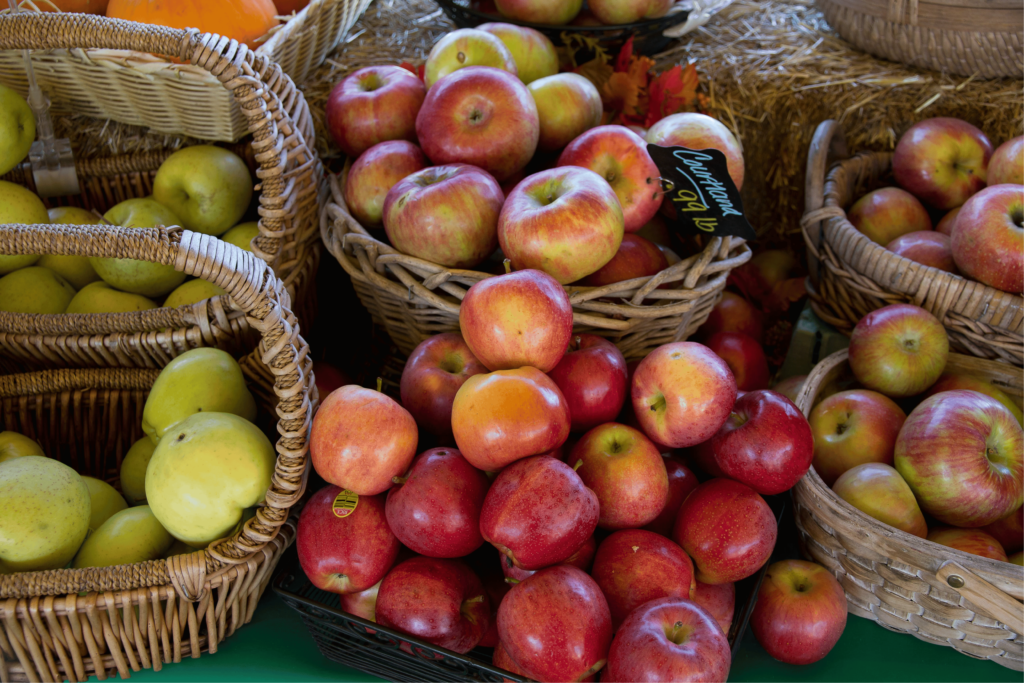
Evidence-based studies have shown that apples can lower cholesterol levels.
They also prevent colon and other types of digestive cancer.
Eating apples reduces the risk of lung cancer and cardiovascular disease. It also reduces the risk of asthma and Type 2 diabetes.
Tru-Cape is the best apple supplier in South Africa.
Berries
There are various berries found in South Africa.
Blackberries are good sources of Vitamin C, K, and E.
They also contain folate and the purple pigment anthocyanin, a flavonoid.
These nutrients are essential for preventing chronic diseases.
Research indicates that blueberries have slower cognitive decline.
Blueberries are crucial in protecting against heart disease and cancer.
They also help maintain bone strength, mental health, and healthy blood pressure.
They also delay the ageing process by facilitating DNA repair.
Kiwis
Kiwis contain vitamin C, vitamin K, and vitamin E.
They also boost dietary fibre, folate, and phytonutrient flavonoids and carotenoids.
Kiwis also contain chromium, which helps manage diabetes and fat metabolism.
Lutein and zeaxanthin are carotenoids found in Kiwi fruit. They facilitate the reduction of age-related macular degeneration.
Mango
This glorious fruit is a good source of vitamins A, C, and E, carotenoids, and potassium. It also contains calcium, phosphorus, and magnesium.
Are you reminded of Mango Airlines? Forgive us. We’re taking fruit here.
They contain soluble fibre, pectin.
Mangoes contain a lot of beta-carotene. The body converts it into Vitamin A.
This powerful oxidant helps protect against cancer.
Oranges
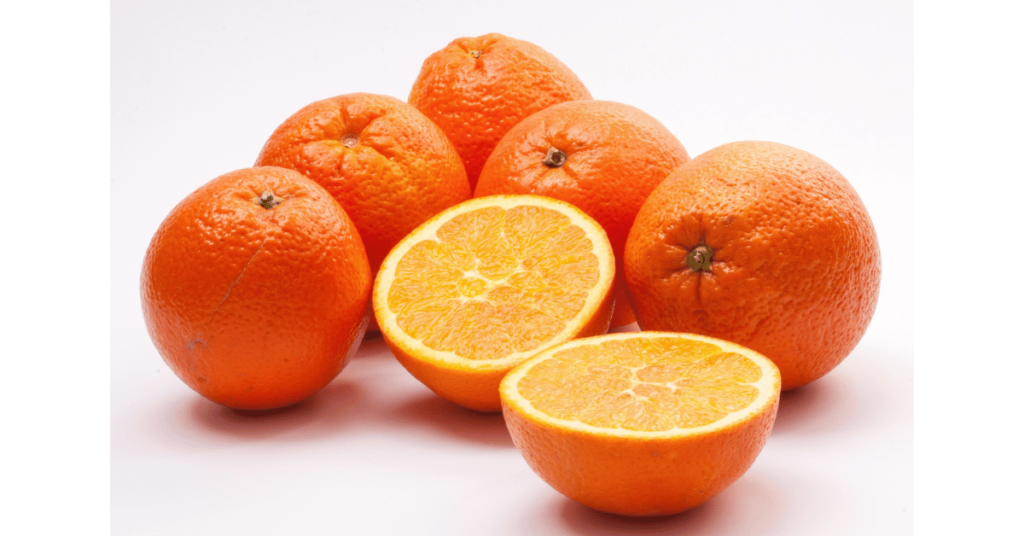
Eating oranges in South Africa will give you incredible health benefits.
Oranges have lots of vitamin C and dietary fibre, which help digestion and the gut.
These foods contain minerals that help the heart and control blood pressure.
Legumes as a Healthy Food for Your Health: A Healthy Choice
In South Africa, legumes are plenty.
Legumes are the best plant-based protein source.
They are available in all seasons.
Scientists agree that plant-based protein is the key to optimal health. It also helps prevent disease.
There is a variety of plant-based protein foods.
Beans
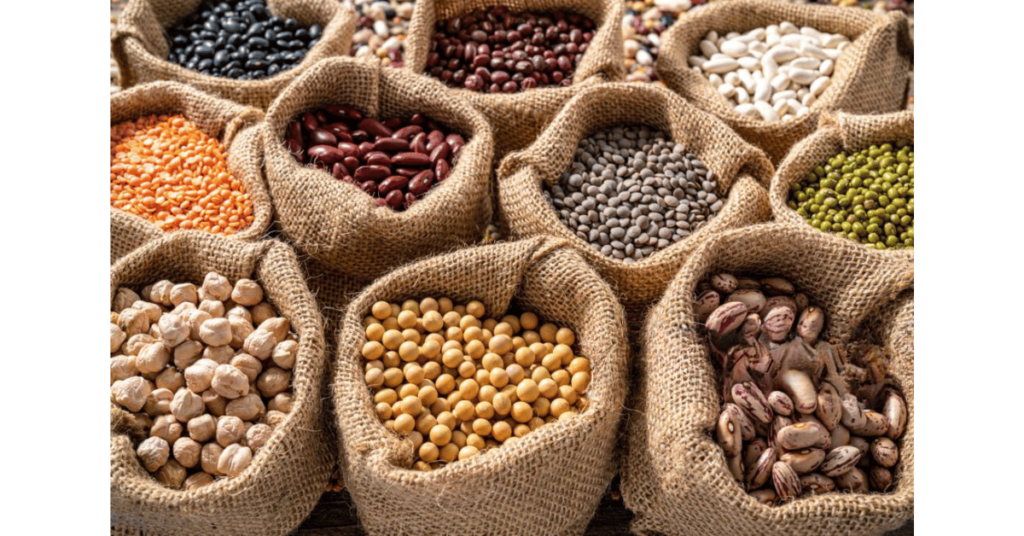
Various beans improve heart health. Examples include red beans, red kidney beans, black-eyed peas, lentils, and pinto beans. Beans contain magnesium, iron, zinc, and potassium, especially red kidney beans.
Phytonutrients in beans, such as diosgenin, inhibit cancer cells from multiplying. In beans, there are essential enzyme-enhancing minerals called molybdenum.
Molybdenum handles detoxifying sulphides.
Umngqusho
Umngqusho is a traditional South African dish.
It is a combination of beans and samp. (A legume and grain)
Chickpea or Garbanzo Bean
Garbanzo beans contain protein, dietary fibre, folate, thiamine, pyridoxine, and vitamin K.
It contains manganese, copper, phosphorus, iron, magnesium, and potassium.
Calcium, zinc, phytonutrients, phytosterols, and phenolic acid are also available.
Garbanzo beans have seventy per cent fibre. It remains undigested because it is both soluble and insoluble. This process helps colon health.
Chickpeas contain the powerful antioxidant mineral selenium.
Nuts and Seeds Healthy Foods for a Healthier You
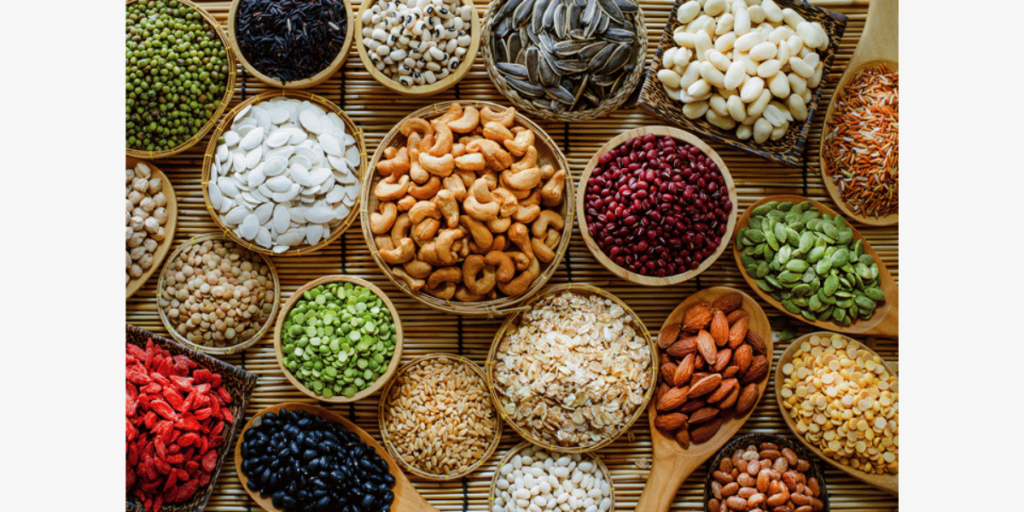
Nuts are high in calories but rich in proteins, minerals, and monounsaturated fats.
They contain arginine, an amino acid. This amino acid protects the inner linings of the arterial walls.
Arginine also makes a critical molecule called nitric acid. Nitric acid helps relax constricted blood vessels and ease blood flow.
Studies show nuts lower the risk of heart attack and cardiovascular disease.
Nuts can also be used as a weight-loss plan if used in moderation.
Almonds
Almonds are rich in monounsaturated fats.
Fats from almonds lower cholesterol.
They contain alpha-tocopherol, a vitamin E. Alpha-tocopherol antioxidants prevent free radical damage. This damage results in the oxidation of cholesterol and injures cells.
Walnuts
Walnuts boost the highest amounts of omega-3 fatty acids than any other nuts.
They are the richest source of antioxidants. These include ellagic acid, ellagitannins, catechin, and melatonin.
Chia Seeds
Vital nutrients fill chia seeds.
They help with digestive health and weight loss.
Besides nuts and seeds, can whole grains be healthy?
Whole Grains: A Healthy Choice for Your Health
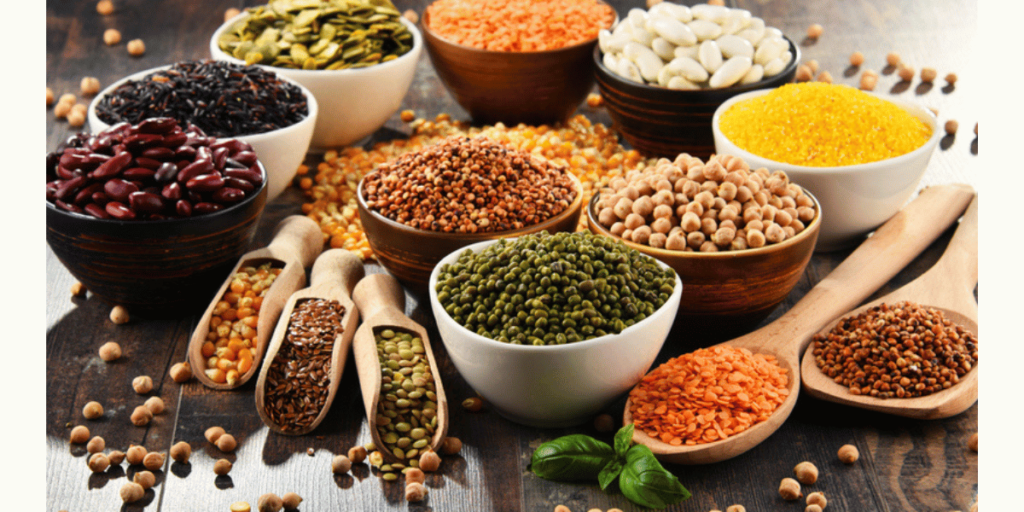
Whole grains are any cereal or pseudocereal. They contain the endosperm, germ, and bran.
Bran in grains is the nutritious outer part. The germ is the seed’s nutrient-rich embryo. The endosperm is the grain’s food supply. It is high in starchy carbohydrates. The carbohydrates quickly metabolize into sugar.
Whole grains contain iron, magnesium, manganese, phosphorus, selenium, and vitamins. They also contain dietary fibre.
Whole grains are good sources of complex carbohydrates. They are naturally high in fibre and contain some essential vitamins and minerals.
Science shows that there’s reduction of the risk of type 2 diabetes and heart disease.
The reduction of these chronic diseases happens to those who consume whole grains.
Whole-grain healthy foods for you are Quinoa, Bulgur and Oats.
Quinoa
Quinoa contains saponins and phytonutrients that help to prevent cancer and heart disease.
It provides protein, lysine, and an amino acid missing in other grains.
Lysine has anti-inflammatory effects.
Eating Quinoa helps regulate blood sugar and high blood pressure.
Whole Oats
Oats are the healthiest grain food on earth.
Oats contain a soluble solid fibre called beta-glucan. This fibre significantly affects blood sugar and cholesterol levels.
Soluble fibre helps stabilize blood sugar. It also slows digestion and creates a feeling of fullness.
Conclusion
Now that we’ve explored the best and most amazing health foods for health in South Africa.
Now it’s your turn…
What changes are you going to make?
Which healthy food for your health are you going to start with?
Whatever you decide, let me know by writing a comment below.

1 thought on “The Best and Amazing Healthy Foods for Health in South Africa”